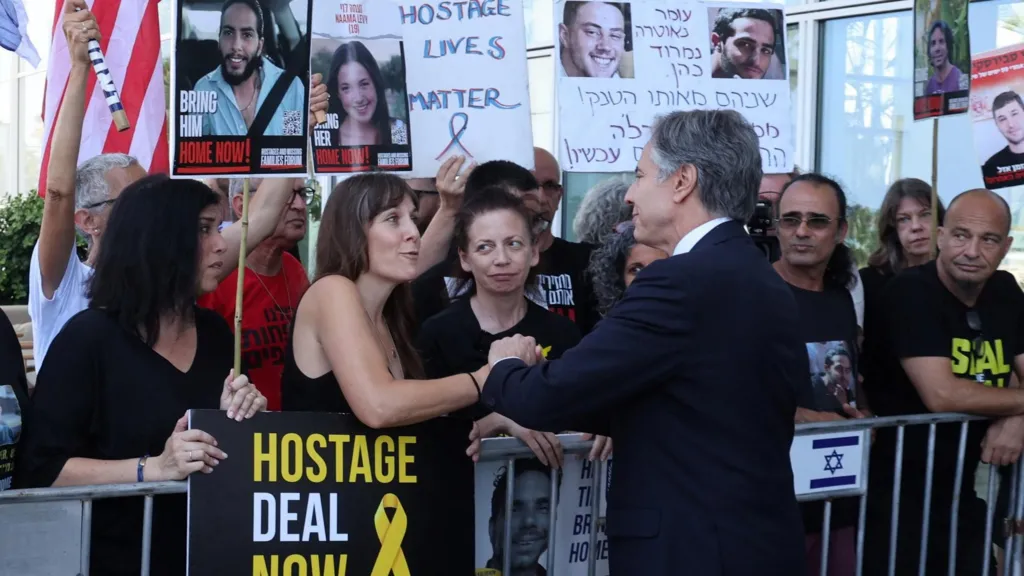
US Secretary of State Antony Blinken has arrived in Qatar to push for agreement on a Gaza ceasefire and hostage release deal which currently hangs in the balance after a Hamas response to the latest proposals.
Mr Blinken was said to have been up late into the night assessing the text handed by Hamas to mediators Qatar and Egypt.
The Palestinian armed group said it was ready to “deal positively” with the process but stressed the need for Israel to agree to a permanent ceasefire.
Israel’s government has not commented, but an anonymous Israeli official said Hamas’s response amounted to a rejection.
The BBC is part of the travelling press pool on Mr Blinken’s visit to Doha, where he is meeting Qatari leaders to try to push the plan forward.
The glittering Gulf location belies the sense of regional crisis that he is attempting to solve with a diplomatic tour taking place at breakneck speed.
On Tuesday, Mr Blinken said Israeli Prime Minister Benjamin Netanyahu had reaffirmed his commitment to the ceasefire proposal and that only Hamas stood in the way of progress.
However, Mr Netanyahu has not yet publicly endorsed the plan, which US President Joe Biden said had been offered by Israel when he outlined it 12 days ago.
The brief statement issued by Hamas on Tuesday evening confirmed it had given an official response to the latest ceasefire plan, which has garnered broad international support and was endorsed by the UN Security Council on Monday.
This reiterated a demand for what Hamas called “a complete halt of the ongoing aggression against Gaza”, and full withdrawal of Israeli forces from the Palestinian territory.
A Hamas official, Izzat al-Rishq, said the response was “responsible, serious and positive” and that it opened up “a wide pathway” to reach an agreement.
The Israeli prime minister’s office did not release an on-record reply.
But a statement was issued by an anonymous Israeli official, who said that Hamas had “changed all of the main and most meaningful parameters” and “rejected the proposal for a hostage release that was presented by President Biden”.
The more critical reaction is now awaited from mediators, once they have studied the proposal and judged the extent of the Hamas amendments.
The US state department official said Mr Blinken despatched two senior Biden administration figures, Barbara Leaf and Derek Chollet, from the US delegation’s hotel in Jordan’s capital, Amman, to receive the document from Egyptian intelligence chief Abbas Kamel, who was also staying in the city.
Qatar and Egypt said in a joint statement that they would study Hamas’s response and “co-ordinate with the parties concerned regarding the next steps”. They also pledged to continue their mediation efforts with the US “until an agreement is reached”.

The Israeli military launched a campaign in Gaza to destroy Hamas in response to an unprecedented attack on southern Israel on 7 October, during which about 1,200 people were killed and 251 others were taken hostage.
More than 37,160 people have been killed in Gaza since then, according to the territory’s Hamas-run health ministry.
A deal agreed in November saw Hamas release 105 of the hostages in return for a week-long ceasefire and some 240 Palestinian prisoners in Israeli jails. Israel says 116 hostages are still being held, 41 of whom are presumed dead.
Mr Biden said the new proposal involved three phases.
The first would see an initial six-week ceasefire, when Hamas would release some of the hostages – including women, the elderly and the sick or wounded – in exchange for Israel releasing an undefined number of Palestinian prisoners.
A second phase would see all remaining living hostages released and the withdrawal of all Israeli forces from Gaza as part of a “permanent cessation of hostilities“, but the latter would still be subject to further negotiations.
In the third phase, the remains of any dead hostages would be returned and a major reconstruction plan for Gaza would commence.
The Qatari prime minister emphasises the need for a “permanent solution” to the Gaza war rather than simply “temporary measures”.
He also said a “just solution” should lead towards the establishment of a sovereign Palestinian state based on the 1967 borders with East Jerusalem as its capital.
Such a state should live “side by side” with Israel in peace and security, he said.
In an speech at a Gaza aid conference in Jordan on Tuesday afternoon, Mr Blinken said the single most effective way to address the humanitarian crisis in the Palestinian territory was to agree an immediate ceasefire.
”When I met Prime Minister Netanyahu yesterday in Israel, he reaffirmed his support and his commitment to bringing this proposal across the finish line.“
He added: “Today… only one thing stands in the way of this deal happening, and that’s Hamas.”
“So my primary and first message today to every government, to every multilateral institution, to every humanitarian organisation that wants to relieve the massive suffering in Gaza: Get Hamas to take the deal.”
Hamas is seeking guarantees from the US that Israel will live up to its commitments under the UN-backed ceasefire proposal, including withdrawing from Gaza and negotiating a permanent ceasefire, according to sources quoted by Reuters.
Earlier, Hamas issued a formal response to the three-stage ceasefire plan, asking for several amendments, including a ceasefire timeline.
However, Israeli leaders, including the prime minister, have insisted Israel is still dedicated to destroying Hamas, raising questions about their commitment to a lasting ceasefire.
He asserted that Hamas “should not require much convincing” because the deal was “nearly identical” to one the group had proposed on 6 May.
While the White House is in effect trying to bounce the sides into progress on an agreement, Israel’s leadership remains deeply sceptical about it.
Far-right ministers are pressuring Mr Netanyahu to ignore Washington’s diplomacy and have threatened to quit his governing coalition and trigger its collapse if the US-backed proposal goes forward, seeing it as a surrender to Hamas.
The prime minister has not unequivocally voiced support for the plan, which he has acknowledged was authorised by his war cabinet.
The actual Israeli proposal – reportedly lengthier than the summary presented by Mr Biden – has not been made public and it is unclear whether it varies from what the president conveyed. It was presented to Hamas days before Mr Biden’s speech.
BBC/AJ/Reuters

